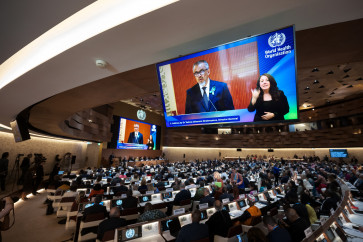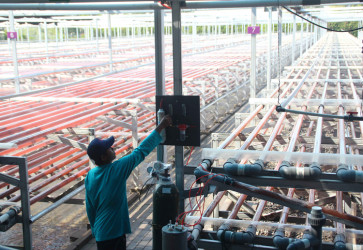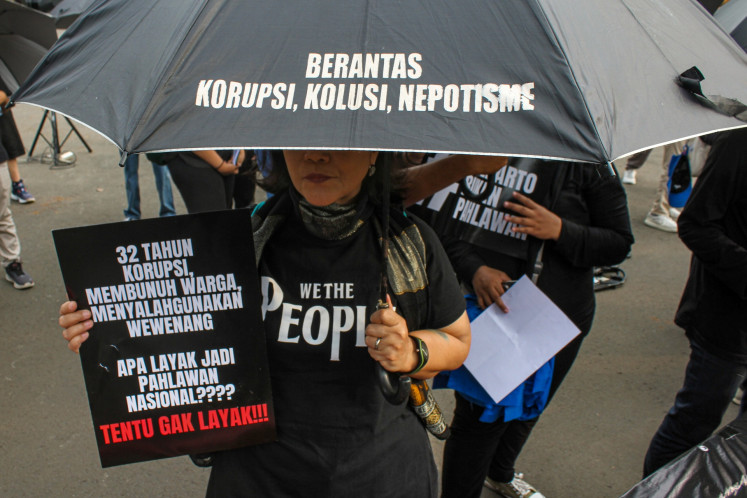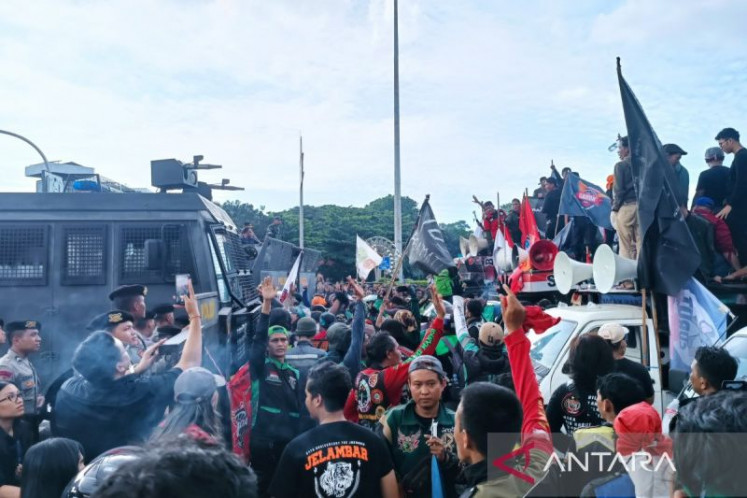Sandwich generation hopes to break cycle
Most elderly people do not have sufficient savings
Change text size
Gift Premium Articles
to Anyone

F
ebrianto Adi Saputro, a 28-year-old journalist from Depok, West Java, has been chipping in for his parents’ daily expenses and to help pay for the education of his two younger sisters for the past four years.
"My father has been working odd jobs since he was laid off from a private company several years ago. He does not have a steady income, while my mother, as a housewife, does not have any earnings," he said on Thursday. "So they largely depend on me to cover their daily needs."
Febrianto, who lives with his grandmother, mother, sisters, uncle and cousin, uses around 20-30 percent of his monthly income of around Rp 5 million (US$348) for his family, leaving only a small sum of money to save up for his own future.
Sometimes, he had to spend large amounts of his savings to cover for his family's unexpected expenses, such as for his father's hospital fees when he contracted COVID-19 earlier this year.
Febrianto is among millions of millennials in Indonesia who are part of the sandwich generation, a group of people who are caring for their children or younger siblings and aging parents or grandparents at the same time. They are mostly in their early or middle adulthood.
In collectivist cultures such as in Indonesia, where family plays an important role to most people, it is common for aging parents to depend on their children to take care of them and for financial support.
A 2020 survey by Statistics Indonesia (BPS) found that most of the 26 million elderly population did not have sufficient retirement savings, with around 78 percent of elderly households, or households with at least one elderly member, dependent on earnings from working relatives as the main source of income. Meanwhile, only 6 and 0.5 percent of the elderly had pension funds and assets respectively that were enough to cover their needs.
The number of young people in the sandwich population is projected to grow, as Indonesia enters the early stages of an aging population, with the number of people over the age of 60 having doubled in the past 50 years.
Read also: Indonesia enters early stages of aging population
Arfiyani, a 29-year-old private sector worker from Bekasi, West Java, used to spend more than 50 percent of her salary to foot her parents' bills and to help cover her two younger siblings' tuition. Her father's pension fund is not enough to cover all her family’s expenses.
"When I worked as a tutor in 2015-2017, I sent most of my Rp 5 million salary to my family. Back then, I did not have any money left to save or to spend on leisure and entertainment activities," Arfiyani said.
Even though her financial situation improved after she was married and started working for her current company, she now has to support her two-year-old son and pay for a mortgage, at the same time still sending money to her parents and siblings.
Millennials wish to cut the cycle
There has been a growing movement among millennials, especially in urban areas, to be more financially independent in their old age and to stop passing the burden of the sandwich generation to their children.
Arfiyani, along with her husband, for example, has been saving up 10 percent of their monthly income to invest for retirement, while Febrianto has been using what is left from his salary to invest in gold.
Center of Economics and Law Studies (Celios) director Bhima Yudhistira said millennials had a high chance of ending the sandwich generation cycle because they had better financial literacy compared with their parents and better access to information on investment options.
"They, however, will face a lot of challenges to prepare for their retirement plans," he said. "Aside from their current huge financial burden [as members of generation sandwich], they have to face economic and job uncertainty triggered by the COVID-19 pandemic, ever-increasing healthcare costs and the overconsumption lifestyle."
Read also: Sandwich generation in Indonesia: Caught between parents and children
He recommended millennials saved at least 30 percent of their salary, either through various investment schemes or pension plans, to achieve a secure retirement.
But he also estimated that only 30 to 40 percent of the country's 69 million millennials would be able to save money for their retirement, either because of a lack of income or over-spending.
Govt needs to step in
Bhima said the government needed to step in to provide better support for the elderly that would eventually remove the burden of the sandwich generation.
A 2020 study by Jakarta-based think tank Prakarsa, which focused on social welfare policies, showed that Indonesia only spent around 2 percent of the state budget on elderly social protection. This pales in comparison with other Southeast Asian countries.
Making matters worse, only 13 percent of the elderly population had access to the government social aid programs, according to BPS' 2017 National Socioeconomic Survey (Susenas).
Researcher Flora Aninditya from the University of Indonesia (UI) Demographic Institute, however, said the government was "on the right track" to support the elderly.
"The government has required all companies to register their employees for social security schemes such as pension plans managed by the BPJS Ketenagakerjaan [Workers Social Security Agency]. The government has also provided extra benefits for elderly households under the Family Hope Program [PKH]," Flora said.
She also said the government was also trying to improve the database of Integrated Data for Social Welfare (DTKS), to ensure that the most vulnerable elderly were protected by social security programs.









